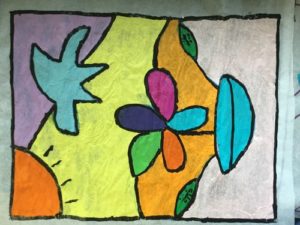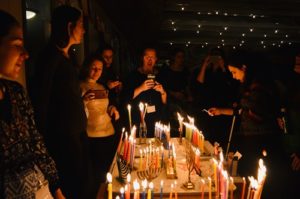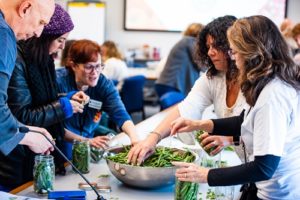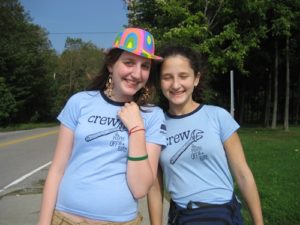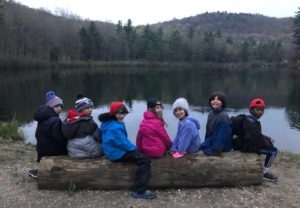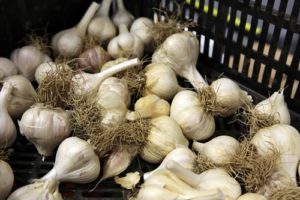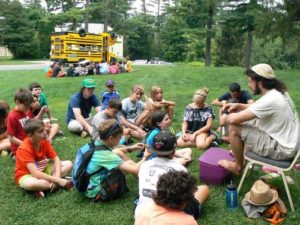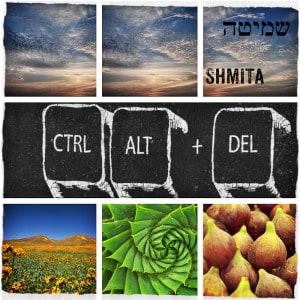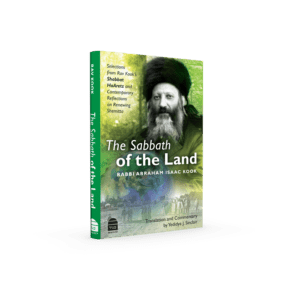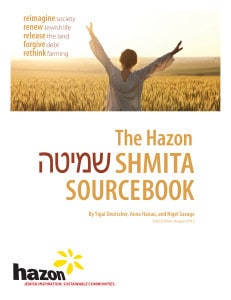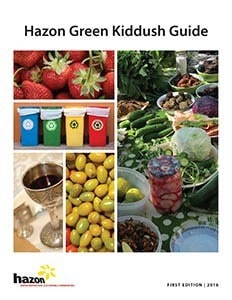Hazon Educational Library: Sustainability
Tie-Dye and Tekhelet
by Stephanie Salem
de Toledo High School
This program introduces participants to natural tie dyes, introduces the concept of tchelet, and is meant to help participants enhance their observation skills by considering what natural materials could lend themselves to different colored dyes.
Age(s): Teens
A Hanukkah Dilemma: Dairy Making, Judith and the Dairy Industry
by Liana Rothman
Isabella Freedman
Three-fold workshop, which involves delving into the history of dairy on Hanukkah, making cheese and butter, and a discussion about the dairy industry and striving towards greater ethical consumption under capitalism, under the lens of our environmental crisis.
Age(s): Adults
Let’s Eat! Why Do We Eat Together?
by Cole Siegel
Isabella Freedman
This program is designed to be primarily a discussion based around eating, looking both at Jewish texts as well as secular contemporary sources.
Age(s): Adults
Pasture Politics: Exploring the Tragedy of the Common
by Clara Feigelson
Pearlstone Center
This program is an introduction to collective responsibility as humans to each other and the Earth in the context of games.
Age(s): Adults, Middle School
Tu B’shvat Outdoor Adventure
by Molly Sease
Milk and Honey Farm
This is a scavenger hunt style program designed as a celebration of Tu B?shvat, the New Year for the Trees. Through a variety of hands-on activities and exploration, students will connect with the holiday through the lens of contemporary Jewish environmental values and will learn the importance of self-and earth care as a whole.
Category: Food & Climate, Jewish Agricultural Traditions, Spiritual Nature Experience, Sustainability
Age(s): Youth
dTHS Stands in Solidarity with the Global Climate Strike
by Stephanie Salem
de Toledo High School
The goal of the program is to educate students and faculty about the global climate crisis and provide them with tangible tools as individuals and as a community to help combat the issue.
Category: Food & Climate, Sustainability
Age(s): High School
Perek Shirah In the Woods: Discovering Songs
by Sarah Rockford
Colby College
This activity is designed to take Perek Shirah off the page and onto the trail?using it as a Jewish tool of observation, discovery, and reflection on the natural world.
Age(s): Young Adult, Youth
CSA Program Write Up
by Hannah Fine
Hazon Detroit
This program seeks to engage the Detroit and metro Detroit Jewish community in an intentional, educational, local, and sustainable food buying practice with clear roots in community and Jewish tradition.
Category: Environmental Justice, Food Systems & Food Justice, Jewish Agricultural Traditions, Sustainability
Age(s): Adults
Climate Change Time Machine All Camp Program
by Aliza Heeren
Eden Village Camp
Storyline: It's the year 3019 and life is pretty grim. And all of the environmental ethics that we knew in 2019 have been lost to history. It's up to us to go back in time to 2019 to save the future!
Age(s): Middle School
Eco-Kosher: Innovation in Jewish Tradition through an Environmental Lens
by Sarah Rockford
Colby College
How can we use concepts of environmentalism to augment and evolve our understanding of what constitutes kosher food? What if we draw on the concept of kashrut and go beyond it to try out a new word: eco-kashrut?
Category: Environmental Justice, Food Systems & Food Justice, Jewish Food traditions, Sustainability
Age(s): Adults
Topsy Turvy Bus
by Hannah Fine
Hazon Detroit
This curriculum engages students with the Topsy Turvy Bus and its sustainable attributes and teaches about sunlight and vegetable oil as alternative energy sources.
Age(s): Early Childhood, Middle School
Shmita Resource Library
Hazon Detroit
This is a collection of shmita resources from all across the internet that Hazon has brought together in one place. Curricula, educational materials, essays, articles, audio, and video.
Shabbat Ha’aretz
by Rabbi Abraham Isaac Kook
Hazon
Rav Kook's Introduction to Shabbat Ha'Aretz is the first-ever English translation of the introduction to a book on shmita (Biblical sabbatical year) by Rabbi Abraham Isaac Kook, first Ashkenazi Chief Rabbi of the land of Israel in the 20th century. His essay, written in 1909, is lyrical and mystical, a meditation on the big themes that underlie religious environmentalism.
Age(s): Adults
Shmita Sourcebook
by Yigal Deutscher, Anna Hanau, and Nigel Savage
Hazon
The Shmita Sourcebook is designed to encourage participants to think critically about the Shmita Cycle – its values, challenges, and opportunities – and how this tradition might be applied in a modern context to support building healthier and more sustainable Jewish communities today.The Shmita Sourcebook is a 120-page sourcebook that draws on a range of texts from within Jewish tradition and time, tracing the development and evolution of Shmita from biblical, historical, rabbinic, and contemporary perspectives.
Green Kiddush Guide
by Becca Linden and Becky O'Brien
Hazon
Included in this guide for synagogues are specific suggestions on how to schedule and promote a vegetarian Green Kiddush, a list of concrete ways to make it “green,” tips associated with each suggestion, and templates of educational signage.
Age(s): Adults, B'nai Mitzvah

